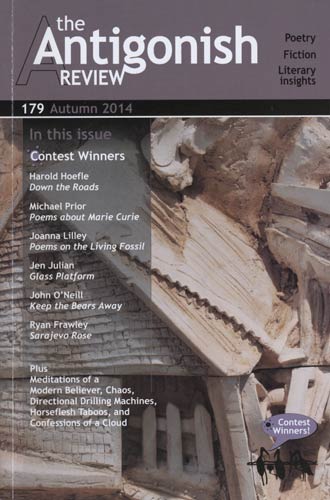The Antigonish Review – Autumn 2014
I’m honored to review this particular issue of The Antigonish Review because it announces the 2014 poetry and fiction contest winners. I’m glad I wasn’t a judge. It must have been an agonizing process to glean the wheat—the winners—from what couldn’t possibly have been literary chaff. I’m honored to review this particular issue of The Antigonish Review because it announces the 2014 poetry and fiction contest winners. I’m glad I wasn’t a judge. It must have been an agonizing process to glean the wheat—the winners—from what couldn’t possibly have been literary chaff.
Forty years old, The Antigonish Review is a quarterly journal published by St. Francis Xavier University, in Antigonish, Nova Scotia, Canada. This is the first journal not published in the United States that I’ve reviewed. I wasn’t sure that would make a difference, but in a notable way, it does. As expected, a majority of contributors are Canadian; there’s also a sizable portion of foreign writers.
There are fourteen poems from the three winners of the 2014 Great Blue Heron Poetry Contest, and the 2014 Sheldon Currie Fiction Contest winners have one story each. In addition to the contest winners, this issue contains works by fifteen other poets, four additional fiction pieces, three book reviews, and an essay—quite a literary offering packed into about 130 pages.
My naval background includes a stint as a Chinese linguist, so it’s no surprise I was drawn to Yi Lu’s translated two poems. I was a bit surprised that she found construction equipment interesting enough to “wax poetic.” Sample this stanza from free-verse “Go Look at the Directional Drilling Machine,” her first piece in the journal: “when you feel bored— / go find the directional drilling machine, my new friend at Ring City Road.” I never knew anybody who was so familiar with a cable-layer that didn’t operate one, nor so clever with describing one.
At the core of Brady Rhoades’s essay is the story of an old fisherman, Franco, telling perhaps the proverbial “fish story,” and the young journalist he befriends. The narrator recounts his days fishing from a pier with Franco and the life lessons Franco shares. Those lessons become life changing as he realizes Franco might have hooked his last fish.
Sarah Bernstein’s “Library Clerks” immediately struck me with the lack of quotation marks. Nonetheless, I had no problem reading the story, which I thoroughly relished. I expected a bit of confusion, but perhaps because of Bernstein’s crafting, there was none. Judge for yourself:
Over they come, said Rachel, Margie Davies’ black-haired little boy staring at the edge of the counter, licking his lips back and forth. Angie says, all right, now, all of you, what do we say to Miss Rachel. And they’re quiet, some of them looking up at me, some of them straight up at the ceiling. Then Joseph Hill turns that enormous dome of his to me and says, Miss Rachel, why do you work here?
I finally explored the book reviews, and settled on Robert Edison Sandiford’s “Making It True.” Sandiford examines Brian Busby’s attempt to take on the daunting task of exculpating notorious Canadian poet/memoirist/translator/pornographer John Glassco. Sandiford does a credible job picking apart Busby’s work, giving the author credit: “But it pays off with a book that gives a lively and accurate account of a Canadian writer. . . ”
For me, reading The Antigonish Review is like taking a cruise. I felt as if I’d traveled to Europe and through Canada, viewing the world in the unique, creative, and entertaining eyes of its writers. The only thing I missed was the deck chairs, stewards, ocean breeze, and of course, the mimosas.
[www.antigonishreview.com]





